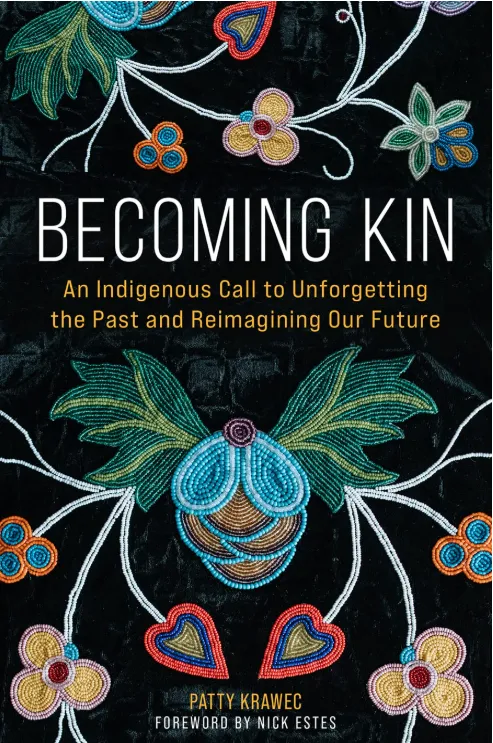
Books We Love: Becoming Kin — A Call to "Unforget" and Reimagine Our Kinship
When I picked up Becoming Kin, I was apprehensive. As a granddaughter of white European settlers in America, my heart aches for what my relatives and their belief systems have done to indigenous people. I was looking for a guide who would offer not just an accurate account of what really happened when settlers invaded and stole the land we now call North America, but for someone who would also offer a way forward.
Because the atrocities are so unspeakable.
Because I live on land in a Native American reservation.
Because I live on stolen land.
And chances are, you do, too.
How do we ever even begin to be forgiven? How do we even begin to dare to ask for forgiveness?
Can we move forward, together?
When I read Becoming Kin, I felt like I was being invited into a circle — a circle where stories, land, ancestors, and futures are boldly acknowledged, confronted, and where we sit together. For me, this felt aligned with the work I already hold dear: creating space for women to listen, soften, and reconnect with the truth of who they are.
The truth of our individual and collective experiences is the only ground to gather upon.
But it goes far deeper than that.
Patty Krawec offers an invitation. Not to perfect knowledge or immediate action, but to the tender process of “unforgetting.” She reminds us that much of what we carry is not just forgotten, but has been deliberately buried. To walk forward, we need courage to uncover, remember, and re-imagine. We need to intentionally “un-forget” what actually happened.
Not to evoke guilt (though us descendents of white settlers are guilty), but to face the truth.
Because the truth is the only place where we can start.
The Weight of Forgetting
One thread that struck me deeply was Krawec’s exploration of creation stories. How Western versions were written over Indigenous ones, erasing stories that connected people to land, kin, and a deeper sense of belonging.
Reading Becoming Kin felt like an invitation not just to unforget the stories of what our history books have erased by omission and invention, but also the stories of my ancestors and the people they displaced and eradicated. The stories of Christianity’s role in this, too. Because Christians are the primarily the ones who committed genocide against the women, children, and men who had inhabited this continent for 20,000 years.
America was not “found”, it was taken by force and invasion.
I am a woman trying to wrestle with these facts, trying to “unforget” and uncover what was never taught us, what was intentionally erased from our collective memory, trying to navigate a path where my guilt is a matter of owning the reality of the past without drowning in a sense of helplessness in the face of such crimes.
Krawac calls us to confront the deepest, darkest parts of what it means to be a white settler on indigenous land, but she doesn’t leave us there. Because guilt and remorse mean nothing without a way to change our behavior for the future.
We can’t change what our ancestors and relatives did. But we can change how we think, speak, believe, and act today.
We can look at a way to move forward through the lens of kinship.
Kinship as a Feminine Principle
Krawec’s central theme of kinship — that we belong not only to each other, but to land, water, sky, and all living beings — resonated with my own beliefs and my work in guiding women back into alignment with the rhythms of the feminine and the earth. (For women are inherently tied to the earth in ways many of us have forgotten.)
We are natural nurturers. We are wired for connection, reciprocity, and care. We are wired for relationship.
And Krawec provides us with a harrowing climb through the realities of the past, then provides us with hope — to embrace kinship and take action toward restoring what has been stolen, and to confront the truth of the brutalities of The Manifest Destiny belief (google it) and its Christian arrogance in asserting itself upon others with spiritual, emotional, psychological and physical violence. There is no sugarcoating this, no way out of the truth of it, no amount of insisting that “this is not what Christianity is about” can change the truth that THIS indeed was what Christianity was about for centuries.
Becoming Kin calls us to confront the truth, to own what was done, to call out the belief systems that enabled and approved of it, and to take action today to move toward reconnecting with indigenous people, cultures, and the earth.
Krawec’s words reminded me that becoming kin is not just about history or activism. It is about living in a way that honors interconnection. It is about remembering we are held in a web larger than we can see. It is about courageously choosing to belong, again and again.
Final words…
Becoming Kin is not a book to rush through. It’s a book to sit with, to breathe with, to let work on you. Krawec’s voice is both patient and powerful, reminding us that unforgetting is not about shame, but about reconnection.
For me, it felt like confirmation of what I already believe: that our lives are meant to be lived in deep connection — to ourselves, to each other, and to the Divine. That we are always in a process of becoming. And that every time we choose to remember, we step more fully into the truth of who we are: kin.
You can buy Becoming Kin here.


